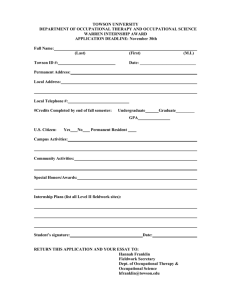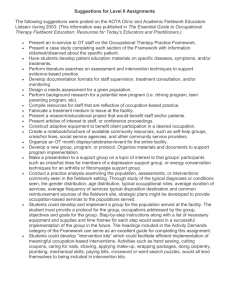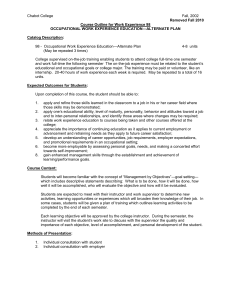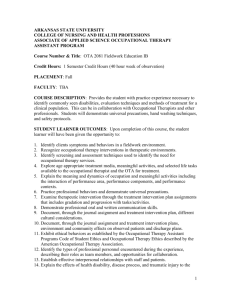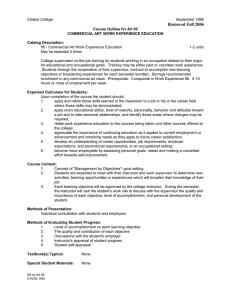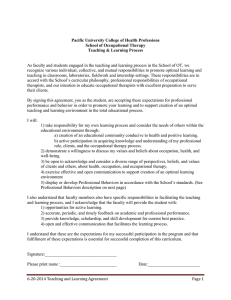CURRICULUM Curriculum Design science, research skills, professional identity/leadership, clinical skills, and theory.
advertisement
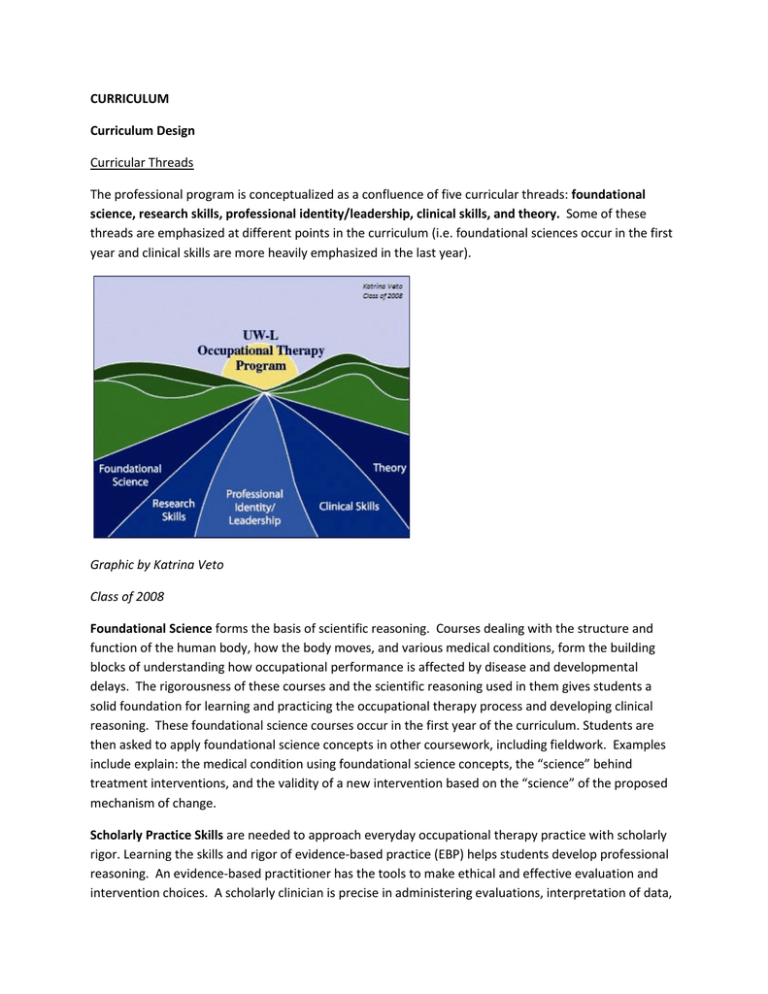
CURRICULUM Curriculum Design Curricular Threads The professional program is conceptualized as a confluence of five curricular threads: foundational science, research skills, professional identity/leadership, clinical skills, and theory. Some of these threads are emphasized at different points in the curriculum (i.e. foundational sciences occur in the first year and clinical skills are more heavily emphasized in the last year). Graphic by Katrina Veto Class of 2008 Foundational Science forms the basis of scientific reasoning. Courses dealing with the structure and function of the human body, how the body moves, and various medical conditions, form the building blocks of understanding how occupational performance is affected by disease and developmental delays. The rigorousness of these courses and the scientific reasoning used in them gives students a solid foundation for learning and practicing the occupational therapy process and developing clinical reasoning. These foundational science courses occur in the first year of the curriculum. Students are then asked to apply foundational science concepts in other coursework, including fieldwork. Examples include explain: the medical condition using foundational science concepts, the “science” behind treatment interventions, and the validity of a new intervention based on the “science” of the proposed mechanism of change. Scholarly Practice Skills are needed to approach everyday occupational therapy practice with scholarly rigor. Learning the skills and rigor of evidence-based practice (EBP) helps students develop professional reasoning. An evidence-based practitioner has the tools to make ethical and effective evaluation and intervention choices. A scholarly clinician is precise in administering evaluations, interpretation of data, and documentation. The coursework in this thread includes content that helps student develop the skills needed to be a scholarly occupational therapist. Evidence based applications are woven into other courses, including fieldwork, to promote application of EBP concepts in different treatment contexts and with different populations. Professional Identity/Leadership is the thread that encompasses how students implement their skills and knowledge as a student and a therapist. The coursework in this thread emphasizes collaborating in teams, assuming leadership roles, internalizing a strong professional identity, demonstrating ability to practice with minimal supervision, valuing life-long learning, serving as a person centered advocate for the client and supporting/ promoting the profession of occupational therapy. Therapeutic use of self, multicultural sensitivity and professional behaviors are strongly emphasized throughout the coursework and all fieldwork experiences. Clinical Skills include the knowledge and skills that occupational therapists use to make decisions at each step of the occupational therapy process. Courses in this thread include focus on occupational performance problems encountered by various populations in different practice settings (both current and emerging) as well as assessment and intervention options. Theory provides guides for understanding practice situations, considering assessment and intervention options, selecting the intervention, timing and method of delivery. Occupational therapy theories are applied in the clinical skills thread in context with populations and practice settings. Scope of the Curriculum Our mission, “to graduate entry level occupational therapist leaders who are committed to providing excellent occupation-centered, person-centered, evidence-based occupational therapy based on foundational science”, drives decisions about the scope of our curriculum. Based on the practice areas of our graduates, we continue to conclude that the best preparation for our graduates is grounding in foundational science, evidence based practice, and clinical knowledge and skills in mental health, physical dysfunction, and pediatric settings. With continued professional development, UW-graduates are prepared to work in emerging practice settings. Curriculum Sequence The overall sequence of courses was designed to steep the students with foundational science courses early so these science concepts becomes the foundation for building each student’s occupational therapy knowledge base. The first year also includes coursework on the building blocks of occupational therapy practice: patient handling, ethics, and introduction to occupational therapy, activity analysis, and group leadership. The end of the first year and first semester of second year is focused on using the foundational science and foundational occupational therapy building blocks to develop clinical skills with different populations in different contexts. There are various points of integration throughout the curriculum • The critical analysis of practice courses (CAP) in the 3rd and 5th semester provide students with the opportunity to integrate content from all courses taught in that semester using case studies. The CAP 2 course, taught in the fall 2 semester uses data that students collect on their physical dysfunction fieldwork in the summer as the basis of a case study that they develop during the semester. • There is some sort of fieldwork experience in each semester of the program. Integrated fieldwork experiences are designed to familiarize the students with a variety of different intervention settings, reinforce course content by applying it to real-life settings, begin to build clinical skills, and develop beginning professional behaviors. Level I Fieldwork is primarily designed to give students exposure to a specific population in different intervention contexts and to help the students continue to develop professional behaviors. Two of the Three Level 1 fieldwork experiences are full time for 1 week to give the student an immersion experience in an occupational therapy setting. Since the population and contexts are different with each of the level I experiences, we do not expect students to develop more proficient skills by the end of the program. However, we do expect the students’ professional behaviors to develop over all of the fieldwork experiences. The debriefing after the fieldwork I placements provides excellent opportunities for integration between the clinic and the classroom. • Patient laboratories for children and adult clients are designed to give students the opportunity to apply the entire occupational therapy process with one adult and one child. Students are expected to demonstrate specific skills to a level of competency and continue growth in professional behaviors. They are supervised (2 students to 1 clinician) and given extensive feedback to help them develop competencies and to become comfortable accepting and learning from feedback. The curricular threads (i.e. foundational science, theory, clinical skills, scholarly practice, and professional identity/leadership) are integrated into the student’s intervention plan for the client. Both of these laboratories are placed in the spring 3 semester (last semester on campus) to aid in the transition from student to student therapist by having a caseload of 2 clients. • The fieldwork II experiences at the end of the didactic content are designed for the student to reach entry level competency in clinical knowledge and skills and professional behaviors. The threads of the curriculum are integrated through assignments (i.e. case study, EBP project, and observation/participation in leadership and advocacy experiences. Occupational Therapy Program Fieldwork Program - Detail Semester Type of Experience Course Professional Behaviors Learning Activities (Hands On) Summer I Nursing Home Visit OT 521: Professional Foundations of Practice Knowledge: Initial exposure to Nursing home setting • • • • Read charts Interview client Observation Client handling techniques Experience designed, supervised, and graded by course instructor • Assessment Administration and scoring Observation of child's and adult's behavior and responses on assessment interview Experience designed, supervised, and graded by course instructor Fall I Child Care Center and Nursing Home Visit OT 551 Applied Assessment Technical skills: basic professional skills (observation, interview, charts, patient handling) Clinical Writing: writes up findings in an evaluation format. Affective/Moral: interview a resident Habits of mind: self-reflection on interview skills Knowledge: knows assessment tool, administers assessment protocol outside of classroom to typically developing child and adult. Context: manages time effectively Habits of Mind: recognizes need for and adjust behavior when necessary Relationships: communicate appropriately with children and older adults; receive feedback from faculty. • • Evaluation 1 Occupational Therapy Program Fieldwork Program - Detail Semester Type of Experience Course Professional Behaviors Learning Activities (Hands On) Evaluation Affective/Moral: demonstrate caring respectful behavior towards child and adult Fall 1 Spring I Nursing Home Interview and Activity Group OT 531 Applied OPA Adults with Mental Illness in community residence Fieldwork I (Part OT 573 Mental Illness Fieldwork I (Part One) Knowledge: Activity Planning and adaptation Commitment to learning: selfdirected Clinical writing: interview note and group write up Context: manage time/plan ahead for activity in specific time slot. Relationships: with peers/residents/TR staff. Beginning advocacy for Occupational Therapy: explain purpose of therapy to a population Knowledge and Integration: apply knowledge of conditions, assessments, interviewing, and interventions in community mental health setting. Implements a plan of care and • • • • Interview a resident using occupations based format. Plan, implement and assess a group activity based on interview findings. Experience designed, supervised, and graded by course instructor Build rapport & establish relationships Interview residents and, plan activity sessions x4 for an individual and a group Experience designed by course instructor. Supervision by course instructor and/or adjunct 2 Occupational Therapy Program Fieldwork Program - Detail Semester Type of Experience One) (20 hrs. appx) Course Professional Behaviors Learning Activities (Hands On) modifies plan based on the residents’ performance. • Develop Technical Skills: Use of health literacy techniques with this population, revamps /redesigns plan in response to resident needs and wishes, uses FWE for guidance as needed. Commitment to Learning: Self-directed Clinical writing: Writes initial note and progress notes. • • • • Administer basic cognitive screening assessment Observation skills Plan, conduct & evaluate activity groups Evaluates FW I Experience Supervisor Feedback Evaluation faculty. Final grade entered by course instructor. Contexts: manages time in sessions, comes prepared for each FW I session. Affective/Moral: Shows respect, empathy, and caring for residents. Upholds AOTA Code of Ethics and Standards of Care during FW-I experience Habits of Mind: Aware of own strengths, completes selfassessment of strengths/weaknesses with this 3 Occupational Therapy Program Fieldwork Program - Detail Semester Type of Experience Course Professional Behaviors Learning Activities (Hands On) Evaluation population. Discusses FW performance with advisor. Spring 1 Structured Observation of occupational therapist and clients in Mental Health treatment setting Fieldwork I - Part Two (10 hrs. appx) OT 573 Mental Illness Fieldwork I (Part Two 2) Advocacy for Profession: Explains purpose of occupational therapy to a population unfamiliar with the profession using appropriate health literacy principles. Relationships: Works on building therapeutic relationships. Communicates with team members and residents. Open to FWE’s feedback, especially therapeutic use of self. Knowledge: generates questions about role of occupational therapy with mental health population. Commitment to Learning: Self-directed interview with occupational therapist and client. Clinical Writing: Narrative or SOAP Relationships: manages self effectively in mental health setting with clients and staff. • • • • 1 day directed observation reflection paper Client and mental health occupational therapist interview to identify occupational therapist's role in mental health. Occupational therapy theory, and clinical practice in mental health facility. Experience designed, supervised and graded by course instructor (who is also the AFWC) 4 Occupational Therapy Program Fieldwork Program - Detail Semester Type of Experience Spring 1 Ergonomic OT 671 evaluation and Physical treatment session Dysfunction I Summer 2 Physical Dysfunction Fieldwork I (40 hours appx). Course OT 790 Physical Dysfunction Fieldwork I Professional Behaviors Learning Activities (Hands On) Context: experience working with a “real” person in a work setting Knowledge/technical skills: Knowledge/technical skills: Complete assessment and recommendations, apply didactic coursework to work context Clinical Writing: writes up an evaluation, and treatment note in a SOAP format Affective/Moral: interview and intervention with a client • • • • administer work evaluation provide recommendations write evaluation note write treatment note Experience designed by instructor. Individual student mentoring provided regarding interpreting results and planning treatment. Graded by instructor. Site visit not supervised. • Build rapport with clients and supervisor Experience designed by course instructor. Student evaluated Advocacy for occupational therapy and Client Advocacy: promotes occupational therapy on campus through participation in ergonomic assessment, helps clients advocate for changes in workplace by providing recommendations for needed equipment. Knowledge, Integration & Context: observe role of occupational therapy in physical dysfunction settings Evaluation 5 Occupational Therapy Program Fieldwork Program - Detail Semester Type of Experience Course Professional Behaviors Learning Activities (Hands On) Commitment to Learning: advocates for own learning during FW experience. Selfdirected to complete assignments. Technical Skills: beginning assessment, intervention and documentation skills for this population. At minimum students develop observation skills, and as allowed by the site, may participate in hands-on practice of skills in the OT Process (assessment, intervention planning and implementation, and documentation) Relationships: participates in the student FW supervisor relationship, receives feedback on FW performance from FW supervisor. Affective/Moral: considers the needs of the client when observing treatment sessions (comfort being observed, interacting with client etc.) Demonstrates respect, empathy and caring.. Upholds AOTA Code of Ethics and Standards of Care during FW-I experience. • • • • assist with evaluation, intervention plan and implementation as appropriate for setting document case study information Evaluate FW I experience Supervisor Feedback Evaluation by Fieldwork Educator, Students complete evaluation of FW experience, FW orientation and debriefing conducted by course instructor and AFWC, final grade by course instructor 6 Occupational Therapy Program Fieldwork Program - Detail Semester Summer 2 Type of Experience Qualitative Interview, Data Analysis and Synthesis. Course OT 760 Professional Behaviors Learning Activities (Hands On) Habits of Mind: completes a pre and post reflection of professional behaviors. Discusses FW performance with advisor. Knowledge and Technical • Skills: continue development of interviewing skills, begin • developing data collection skills. Commitment to Learning: • Students must manage their own time, seek out interviewees, and find resources to complete their project. Self- reflect on own performance in class. Context: as students apply interview skills from the classroom to the field, manage their time to obtain needed information from interviewees, and come to class with data in order to analyze as a class. Relationships: Communicate with interviewees, and work as a team to complete the project. Affective/Moral: Show respect to interviewees, do not pass judgment on ways of life that Locate and interview people from across the lifespan Synthesize data from a community to describe a “profile” of that small town identifying how occupations emerge from values, meaning, and context Evaluation Final product evaluated by instructor; interview experience processed through class discussion and related to level and quality of obtained data; supports Clinical Skills Thread (Use of Self), Scholarly Practice Thread (data collection and reasoning), and Leadership Thread (working in teams) 7 Occupational Therapy Program Fieldwork Program - Detail Semester Type of Experience Course Professional Behaviors Learning Activities (Hands On) Evaluation may be new to them, and conduct self professionally. Fall 2 Home Evaluation and recommendations OT 630 Therapeutic Adaptations Habits of Mind: Demonstrates curiosity about topic, recognize own biases and feelings. Reflects on success of project, identifies strengths and problems of the project, and problem solves potential solutions. Knowledge/Technical skills: Completes a home assessment Commitment to Learning: Choses own client based on interests and desire to practice specific evaluation. Selfdirected; no supervision during assessment Clinical Writing: Writes up home assessment in SOAP note format Integrative: Develop consultation skills using clinical judgment and reasoning. Context: Works with a client in their home • • Complete home assessment and provide recommendations Write an evaluation note Experience designed and graded by instructor. Home evaluation is not supervised. 8 Occupational Therapy Program Fieldwork Program - Detail Semester Fall 2 Fall 2 Type of Experience Interview of a person with a chronic condition • • Course OT 779 Applied Psychosocial OT 651 Play Pediatrics I Observation &Assessment Development al Assessment. Professional Behaviors Affective/Moral: Works with a “real” person (not fellow student). Demonstrates empathy, respect, and caring. Knowledge/Technical Skills: build on interview skills, applies didactic information to a community- dwelling adult with a chronic medical condition, builds on documentation skills. Integrative: Build on clinical reasoning skills Relationship: Demonstrates respect, empathy, and caring for client interviewed. Builds on therapeutic use of self. Technical Skills: Administer a standardized tool, sustain observation skills, and being simultaneously playful and scholarly as they interact with a child. Build on assessment skills, documentation and written communication. Learning Activities (Hands On) • • • • • • • • Evaluation Independently complete interview Document and present findings to peers and instructor Experience designed by instructor. Interview paper and presentation graded by instructor. Interview not supervised. Students responsible for finding child Practice observation skills Complete a play assessment Complete a developmental assessment Document results in written report. Give and receive peer feedback Instructor designed and graded; students must selfreflect using guided questions as prompts. 9 Occupational Therapy Program Fieldwork Program - Detail Semester Type of Experience Course Professional Behaviors Learning Activities (Hands On) Evaluation Integrative: Integrate knowledge, test administration principles, and clinical reasoning with a typically developing child. Commitment to Learning: Find their own children to test, organize their time outside of class to complete the assignment. Context: Work with a client in their natural context, and apply didactic knowledge and skills to a community context (home, school, etc.) Relationships: Practice communication when working with the client and family, and partner. Affective/Moral, Demonstrate respect for the client and the client’s values, and abstain from judgment. Habits of Mind: Self-reflect on performance, and identify any beliefs that may have interfered with the administration of the tool and/or their final reports. 10 Occupational Therapy Program Fieldwork Program - Detail Semester Type of Experience Course Professional Behaviors Learning Activities (Hands On) Winter Term 2 Pediatric Fieldwork II – 40 hours OT 791 Pediatrics Fieldwork I Knowledge: Identify adaptation, clinical reasoning in action, and therapeutic use of self by the clinician • • Technical Skills: observe role of occupational therapy in pediatric settings, beginning assessment, intervention and documentation skills for this population. Practice evaluation, reasoning, therapeutic use of self, etc., with children. Continue developing therapeutic relationships. Integrative: Identify instances of reasoning, and apply knowledge taught in Peds I, OT 651, Fall semester. Commitment to Learning, Complete Fieldwork I assignment with reflection and depth. Habits of Mind: Reflect on own behaviors & performance in the setting Context, Apply didactic knowledge in a pediatric setting. • • • • • Practice observation skills Participate in evaluation, intervention planning and implementation as appropriate for setting Document reasoning in action, Identify and reflect on therapeutic use of self as observed in clinician and self. Identify professional reasoning, with accompanying theoretical foundations Evaluate Fieldwork I experience Supervisor feedback Evaluation Experience designed by course instructor. Student evaluated by Fieldwork Educator (FWE) Orientation and debriefing by course instructor and AFWC Final grade entered by course instructor 11 Occupational Therapy Program Fieldwork Program - Detail Semester Spring 2 Type of Experience Adult Lab Course Professional Behaviors Relationships: Interact with children and clinician supervisors Affective/Moral: Respond to children/clients and their supervisor OT 785 Adult Knowledge & technical skills: Clinical Completes the occupational Practice and therapy process with a client. OT 786 Adult Integrative: Incorporate basic Clinical science, evidence, and theory as Practice they develop evaluation and Applied treatment plans for client. Commitment to learning: Develops treatment plans is selfdirected, seeks out own learning to develop these plans. Clinical writing: Completes all forms of documentation in the occupational therapy process evaluation, treatment plan, treatment notes, home evaluation, and discharge summary. Context: Uses classroom/ “clinic” as intervention context, completes home or community assessment. Learning Activities (Hands On) • • • • • • • • • • • • Observation Communication with client and family Therapeutic use of self Administer assessments Intervention planning Intervention implementation Documentation Evidence based practice Outcome measures Professional behaviors Present patient in “rounds” Supervisor and peer feedback Evaluation Experience designed by course instructor. Overall experience monitored by course instructor Students supervised by adjunct instructors under guidance of course instructor Final grade entered by course instructor 12 Occupational Therapy Program Fieldwork Program - Detail Semester Spring 2 Type of Experience Pediatrics Lab Course OT 741 Applied Pediatrics Professional Behaviors Relationships: Receives direct supervision and feedback from instructor. Discusses performance with advisor. Habits of mind: completes selfreflection after each treatment session. Affective/moral: considers the client's needs throughout the process. Demonstrates empathy, respect and caring. Clinical Skills: Implements aspects of the occupational therapy process with single child under supervision (in pairs). Knowledge: Apply classroom knowledge in a real life situation, problem solve evaluation and intervention implementation activities. Technical Skills: Apply the occupational therapy process, practice test administration, write reports, plan and implement interventions. Integrative: Use clinical reasoning in intervention planning and implementation, Learning Activities (Hands On) • • • • • • • • • • • Observation Communication with client and family Therapeutic use of self Assessment Intervention planning Intervention implementation Documentation Evidence based practice Outcome measures Professional behaviors Supervisor and Peer feedback Evaluation Experience designed by course instructor. Overall experience monitored by course instructor. Students supervised by adjunct instructors under guidance of course instructor. Final grade entered by course instructor. 13 Occupational Therapy Program Fieldwork Program - Detail Semester Type of Experience Course Professional Behaviors Learning Activities (Hands On) Evaluation and documentation (report and daily notes) Commitment to Learning, Seek out new knowledge that was not explicit in coursework, self-directed Context: Practice with child in clinic and home, manage schedule in relation to the family’s needs. Relationships, Practice communication with the family and client, receive direct feedback from mentors, Habits of Mind: Debrief each session, and identify what worked and what didn’t. Adapt to the client’s schedule and lab schedule. Affective/Moral, Practice acceptance of clients’ values that may be different than their own, Show respect for their partner and their mentor. Demonstrate empathy, caring, and respect for child and family. 14 Occupational Therapy Program Fieldwork Program - Detail Semester Type of Experience Course Professional Behaviors Learning Activities (Hands On) Summer 3 Fall 3 Fieldwork II OT 795 See FWPE for specifics professional behaviors expected. • • • • • • • • • • • • Additional Learning Activities beyond FW II objectives at site: Case study EBP in-service D2-L discussion boards to include: Leadership abilities/opportunities Occupational therapy Promotion and advocacy Use of occupation in clinical site Experiences developing cultural competencies Psychosocial factors Student evaluates FW experience Supervisor Feedback AFWC feedback Evaluation FW Objectives designed by site and program. Additional objectives/assignm ents designed by program. AFWC supervises, and grades all FW II assignments required by the program. AFWC determines and enters the final grade. 15 Promote Clinical Reasoning C.1.11 Concept Clinical Reasoning & Reflective Practice OT 795 Objective Number on Syllabus 2.c Ethical Practice 3.0 Professionalism 1.a and 1.c Student Reflections D2-L Discussion Question 3: How has your clinical experience helped you develop your clinical judgment & reasoning? D2-L Discussion Question 4: Review the AOTA Ethics Document. Given your current experiences in fieldwork II, give an example of how ethical decision making is seen on fieldwork II. Student Evaluation of Fieldwork Experience (SEFWE) K: Academic preparation: 10 (Professional Behavior) Student Learning Outcomes Assessment Plan 3.0 (100% score 3 or better on FWPE items) Assessment Measure and Benchmark Results FWPE Item 2: 4 & 5 2011 – 100% 2012 – 100% 2013 – 100% 2014 – 100% 4.1 (100% score 3 or better on FWPE ethics items) FWPE (Item I: 1,2,&3) 2015 – currently in FW II 2011 – 100% 2012 – 99% 2013 – 99% 2014 – 100$ 2015 – currently in FW II 4.2 (100% score 3 or better on FWPE professional behaviors items FWPE (Section 7:36 – 42) 2011 – 99% 2012 – 99% 2013 – 100% 2014 – 100% 2015 – currently in FW II 1 University of Wisconsin – La Crosse Occupational Therapy Program Professional Behaviors Threaded in the Curriculum Semester Summer I Course Introduction to Occupational Therapy Foundations of Practice Fall I Group Dynamics Learning Activities Exposure to Therapeutic Modes used to develop rapport/trust when working with clients. Self-Reflection Journaling Assignments (4 Total) Class Participation is graded Client Interviewing and communication techniques introduced. First attempt at interview in a skilled nursing facility Students required to complete written documentation of interview. (SOAP format) Complete Thomas Kidman Conflict Mode Instrument and Meyers Briggs Type Indicator. OTS write a comprehensive paper assessing their professional behaviors, conflict and personality types. Paper is sent with permission of the OTS to their faculty advisor. This information is used as a way to begin the Pro Advising Process. Notes 2 Semester Course Human Movement BioMechanics Applied Assessment FIRST FACULTY ADVISING Learning Activities Notes OTS are responsible for leading 2 groups. Self-Critique is required. Also peer critiques are required. Critiques are given verbally and written by all OTS and instructor. OTS written communication assessed through short quizzes. OTS are challenged to think more broadly and integrate knowledge on a deeper level to help facilitate learning within graduate school Introduction to Practical Exams. Professional behaviors of verbal communication and observation are addressed. OTS given verbal feedback on skills. OTS given feedback on professional behaviors in regard to the development of a therapeutic relationship. Areas of Concern/Possible Review Student’s Professional Talking Points Development Form and Professional Development Paper (completed in Group Dynamics) OTS complete Self- Assessment of Professional Behaviors Form. Faculty advisor explains advising process and professional development. Explain professional behaviors on FW-I will be discussed in these advising meetings. 3 Semester Course Learning Activities Notes Spring I FW I: Mental Illness OTS evaluated using the FW I Evaluation Form. During FW, students complete a journal and D2L discussions which focus on communication skills, therapeutic relationships, ethics , reflective practice/clinical reasoning and areas of concern for the mental health population. See FW I form for details Research II OTS sets 1-2 professional development goals for semester Self-Evaluates progress at end of semester. Instructor Feedback OTS work in small groups to solve case studies (PBL format) Receive feedback from peers and instructor on their interpersonal skills/participation. Lab Practical Exams: Now with Stronger emphasis on written and verbal communication with patients. Instructor feedback provided. Hands on Job site Critical Analysis of Practice I(CAPI) Physical Disabilities I Check the follow areas: academic performance, introduce the concept of a professional portfolio, work load demands, how settling in to grad school, advisor/OTS get to know each other. 4 Semester Course Second Faculty Advising Session Learning Activities Notes See FW I Form evaluations completed with volunteers from UWL campus. Written documentation practiced. Areas of Concern/Possible Talking Points FW I Mental Experience Academic Concerns Review of Self-Assessment Student Reestablished goals Graduate School Demands SOTA Involvement Professional Organization Involvement FW II? Summer II FW I: Adult Physical Disabilities FW I Form Used to Evaluate Professional Behaviors Fall II Third Faculty Advising Areas of Concern/Possible Talking Points FW I experience in Adult Phy Dis Academic Concerns Review of Self-Assessment of Pro Behaviors Form-reset goals Involvement in Professional Organizations (AOTA, WOTA) Advocacy for Profession Professional Portfolio Development SOTA involvement FW II Affiliations—what need to know 5 Semester Course Physical Disabilities II Older Adult Assistive Technology Evidence Based Practice Pediatrics II CAP II FW I: Pediatrics Applied Psychosocial Learning Activities Future growth areas: other professional interests, research interests, pursuit of a PhD or OTD? See Phy Dis I Documentation for Medicare/Insurance OTS complete a home assessment with a client. Interacts with both care givers and clients. Documentation of assessment is required. Set professional development goals as part of the course grade. Final grade is based on student self- assessment and instructor assessment. Participation is graded. Emphasis on Client Advocacy and continued writing skills OTS are required to complete a oral case study presentation. Receive feedback from instructor and peers. See FW I Evaluation Form for details. OTS demonstrate and receive feedback on professional behaviors necessary to develop a therapeutic relationship (active listening, developing rapport, repairing empathetic breaks, Notes 6 Semester Course Learning Activities Spring II Fieldwork Seminar OTS Revisit initial SelfAssessment of Professional Behaviors and paper for Fall I. OTS reflects on their progress and development of skills while in the OT program. OTS brings this information to FW II and shares with Fieldwork Educators on site. OTS set goals for FW II. Fourth and Final Faculty Advising Session Final Self-Assessment of See FW II Personal Data sheet Professional Behaviors FWI Experience in Pediatrics Discuss goals for FW II Begin to discuss transition to FW II Identify areas needing attention before leaving UWL. Discuss FW II expectations, independent learning, lifelong learning, student supervision. Interaction skills, reasoning in action, professional behaviors, continued documentation/writing abilities, review of competencies Feedback on Oral Presentation and the development of a Wellness Program Pediatric II Lab Wellness managing difficult behaviors, group leadership/group work/class participation) Notes 7 Semester Course Adult Lab Applied Writing Summer and Fall III FW II: Summer and Fall Learning Activities Interaction skills and professional behaviors when working with clients. Instructor feedback on all professional behaviors and writing skills. OTS demonstrate their ability to receive feedback from peers and faculty on professional writing. Notes D2L Discussions on use of self, See FWPE, Mid Term Site ethical dilemmas, clinical Evaluation Form, D2L questions. reasoning. Receive formal Mid Term Evaluation from Clinical Site. UWL AFWC conducts site visit to review the evaluation and to identify concerns/problems the OTS might be having. Learning Contracts designed as needed. University of Wisconsin-La Crosse Occupational Therapy Program Self -Assessment of Professional Behaviors The Occupational Therapy Program Director and faculty advisors value and encourage a student therapist’s development of his/her own professional identity. Professional identity is developed, in part through the self- reflection of your own professional behaviors, motivations and actions. This selfreflection along with feedback from mentors, may lead to the development of an action plan which will foster the development of quality professional behaviors. The professional behaviors and values listed below are consistent with our occupational therapy curriculum, current licensure laws, code of ethics, and standards of practice which guide the practice of occupational therapy. Underdeveloped skill (0-2) Performance underdeveloped; needs to improve on skills and behaviors Emerging skills (3-5) Required skills and behaviors are developing but a bit inconsistent, continues to need more work to become proficient Proficient (6-8) Consistent solid performance Professional Behavior Knowledge: Core knowledge base, able to apply knowledge in real world situations, can use tacit knowledge and personal experiences appropriately, able to use abstract problem solving, generates questions to promote learning, uses resources to foster learning. Commitment to Learning: Learning is self-directed, seeks out and is interested in finding new knowledge, recognizes gaps in knowledge, able to learn from experiences, comes prepared to learn for all classes. Technical Skills: Uses all aspects of the Occupational Therapy Framework: Domain and Process throughout the implementation of occupational therapy, anticipates client’s needs, adheres to safety policies and procedures, teaches others (ie, clients) effectively, using health literacy skills, asks for assistance and clarification when needed. Communication – Writing • Clinical Writing: Effectively documents, using a variety of formats in labs and also on FW I when required. • Academic: Writes clearly, for varied audiences, using good technical writing skills, including reasoning/logical sequences Score Description Exceptional skills (9-10) Surpass all requirements. Exceptional performance. Integrative: Incorporates scientific principles, uses clinical judgment Uses clinical reasoning strategies appropriately. Links academic and clinical knowledge effectively across disciplines. Manages uncertainty. Context: Can transfer and generalize skills from one situation to another, adjusts behavior to meet the contextual needs, uses and manages time efficiently and effectively, comes prepared for class and group work, acts proactively, plans ahead. Able to anticipate a need for change and implement a plan of action. Relationships: Communicates effectively with peers, professors, clinicians. ( e.g. written and oral), meets interpersonal commitments, gives and receives feedback effectively, takes personal responsibility for actions, handles conflict effectively, manages teamwork by contributing fair share to group efforts, teaches others effectively, alters behaviors, when needed, in response to feedback Affective/Moral: able to tolerate ambiguity, shows respect for peers and clients, responsive to client’s needs, is empathetic. Adheres to AOTA Codes of Ethics, UWL Policies and Procedures, procedures of FW facilities, professional codes and standards of practice. Emotional Intelligence: ability to perceive, control, and evaluate emotions. http://psychology.about.com/od/personalitydevelopment/a/emotionalintell.htm Habits of Mind: Definition: habits of mind are those habits that allow the practitioner to be attentive, curious, self-aware and willing to recognize errors. These are very difficult to objectify but make for good practice. (Epstein, 2007). Aware of own strengths/challenges, attentiveness, critical curiosity, recognition of and response to own cognitive and emotional bias, demonstrates willingness to acknowledge and correct errors, manages and adapts to change effectively (flexibility), aware of own feelings and how this may influence judgment/reasoning. Advocacy for Occupational Therapy and Patient Advocacy: Involvement and investment in professional organizations: SOTA, AOTA, WOTA. Promotes Occupational Therapy Profession. Supports and demonstrates ways to advocate for patient groups, underserved populations. Wellness :Identifies methods/plan for personal health and wellness List your Strengths: List your Challenges: Write three goals you hope to achieve in the semester 1. Describe how you will achieve each goal ---PLAN 2. 3. Student Signature:____________________________________________ Date:_______________________________ Academic Advisor Signature: __________________________________Date:_______________________________ NOTE: Bring this form to ALL of your advising sessions. At each session, be prepared to: Describe how you have achieved (or not achieved) your goals Establish new or reformat your goals in order to accomplish your goals. References: • Rubric was adapted from the University of California- San Jose, Pam Richardson • Epstein, R.M., MD Hundert, E. Defining and assessing professional competencies, JAMA, 2002: 287 (2): 226-235. UW-L Occupational Therapy Program Fieldwork Program Overview Fieldwork is defined as a student face to face interaction with a client. It may take place in the client’s home, workplace, therapy setting, or in our laboratories. Since the faculty believe in the effectiveness of hands-on learning, The UW-L Occupational Therapy Program has a fieldwork experience in every semester of the program. These experiences are summarized below. · · · · 1) Integrated fieldwork experiences • The purpose of these experiences is to gain exposure to different intervention contexts, reinforce course content by applying it in real-life settings, and begin to build skills and professional behaviors. These are generally organized and directed by faculty. 2) Three Fieldwork I experiences • Connected with each of the major content areas in the program (mental health, physical dysfunction, and pediatrics). • Primary purpose of Fieldwork I is development of student’s professional behaviors. • Students continue to be exposed to different intervention contexts and identify the role of OT in those settings • Students continue to build knowledge and technical skills • Organized by faculty and AFWC; directed/evaluated by OTR or COTA 3) Patient Laboratories for children and adult clients • Primary purpose is to apply the entire occupational therapy process with a single client. • Organized by faculty; supervised and graded in a 1:2 ratio by core and adjunct faculty; extensive individual feedback given on professional behaviors, technical skills, and implementation of OT process • Demonstrate technical skills to a basic level of competency • Continued development of professional behaviors • Integrate curricular threads while applying the occupational therapy process o Basic science o Theory o Clinical Skills o Scholarly Practice (outcome measures & collecting evidence in an intervention session) 4) Two Fieldwork II experiences at the end of the curriculum • Apply didactic knowledge in two clinical settings to entry level competency in knowledge, technical skills, and professional behaviors. • Experience designed by AFWC and FWE, supervised and graded by FWE, assignments graded by AFWC, final grade entered by AFWC. • Integrate threads of the curriculum o Case study assignment (basic science, theory, clinical, scholarship skills) o EBP project (scholarship skills) o Reflection on student’s experiences in observation/participation in leadership, advocacy, and promotion of occupational therapy (leadership, advocacy) Progression through the Curriculum The occupational therapy curriculum has been designed to be completed in a sequential fashion. Courses Coursework during each semester is inter-related, thus courses are taught in sequence and only one time per year. Students must complete all coursework within each given semester and remain in good academic standing in order to progress to the next semester coursework. See curriculum grid for sequence of courses. Students are advised that dropping a course will result in a delay in completion of the program and additional tuition. Semester The occupational therapy curriculum is sequential. Each semester’s coursework builds on material from the previous semester. Students must complete each semester in sequence and in good academic standing. Although students on academic probation are not in good academic standing, they are allowed to progress to the next semester after being put on probation. It is during this probationary semester that students have the opportunity to raise their grades. Failure to demonstrate the mandatory professional behaviors (p. 27) will either delay progression or result in dismissal from the program. Fieldwork II Students must have completed all the academic course work and be in good academic standing to progress to level II fieldwork. Graduation Students must successfully complete the academic and fieldwork portions of the curriculum to qualify for graduation. After graduation, students are eligible to sit for the NBCOT certification examination and then state licensure examinations. Excerpt from the class of 2016 Occupational Therapy Student Manual, Academic Policies, page 43 Retrieved June 23, 2015 from: http://www.uwlax.edu/uploadedFiles/Academics/Graduate_Programs/Occupational_Therapy/6%20%20Academics(1).pdf Class of 2016 FW I and FW II Orientation Meeting September 30, 2014 Objectives for FW Meeting To understand the various types of FW experiences, both Level I and Level II To understand the selection process for both FW I and FW II Overview of FW I Designed to provide students an opportunity to participate in the OT process first hand Practice interview skills Improve observation skills Practice Professional Behaviors in a clinical setting including Intentional Relationships Understand the role of the OT Begin preliminary assessment and intervention skills UWL FW I Program Includes three separate and unique experiences: ◦ Mental Health—Spring I ◦ Adult Phy Dis----Summer II ◦ Pediatrics-----Winter Term II FW I Mental Illness: Part I Purpose of FW I Mental Illness (OT 573) ◦ Practice observing, interviewing, and establishing/implementing intervention plans for a MH population in a non traditional setting. ◦ Each lab will meet for 4 sessions at the FW site over the course of the semester, (SAT may also be included) ◦ Location: Mosher Home, Dresbach, MN FW I Mental Illness: Part II Students will observe OT services in a mental health setting, hospital or out patient based Students sign up Observations ONE FRI. during the spring semester. (additional days are optional) Locations: Minneapolis, Madison, Milwaukee, LaCrosse, EauClaire, Chicago FW I: Adult Phy. Dis. (OT 790) Students will be placed in an Out Patient or In Patient physical disabilities setting J Temple, Course Instructor, provides students with syllabus, learning objectives, assignments, etc. D2L Discussions Locations: Refer to file folders in FW room JT will ask you to complete a location/site preference sheet for this experience. FW I: Adult Phy Dis. Cont. Dates: Summer 2. ONE 40 hour week at site. Select ONE WEEK in July. Note: When checking folders for placements, talk to Joan for more options==may be limited due to: ◦ Contracts, investment of facility to begin new contract for one student, sites interest in FW I Options--Examples Students may decide leave area for FW I. Shannon Medical Center: SanAngelo, Texas—offers free housing for OTS interested in this FW experience. Example: Madonna Rehab, Omaha, Nebraska Rancho Los Amigos, Downey, CA Billings, Montana Student is committed to site once selected. FW I: Pediatrics OT 791) Students are placed in a variety of settings: including: schools, hospitals (in or out patient), private practice Deborah Dougherty is the instructor Syllabus will be provided Locations: all over the state or out of state Options same as Adult Phys Dis slides FW I: Pediatrics ONE 40 hour week over Winter Break OTS may also opt for an out of the Mid West experience. FW II TWO, 12 week full time experiences Summer and Fall of 2016—Final Semesters! Must choose two different areas ◦ Example: Cannot select two peds, two out patient, two rehabs, etc. ◦ Why? You want a broad base of skill, NBCOT exam, marketability, well rounded clinician ◦ Few experiences as an OTS, need to expand interest/learning How do I know what to do? Look at FW folders ◦ Look at the SEFWE and FW data sheets Talk to professors Talk to second year OTS Network with alums What if I don’t know what I want? Not a problem Take a leap of faith Get a broad base of experience Talk to your advisor or Joan Early Decision List See Handout Some OTS know what they want now or have a sense that they want to go _____ Put request in writing How long to I have to make my decision? I will ask you to submit your final requests in March 2014 Last minute changes last day of class in May, 2014 at the latest. Why? OT is a varied Profession You won’t see everything on FW IIGuaranteed You won’t be destined to work in only ONE area of OT because of your FW II experience for the rest of you career Consider what you think you want out of the experience, then where you can find it. Site Availability Tough Times, getting harder Minneapolis/Milwaukee/Madison are very difficult More flexible you are with your location, interests, better for you in the long run. Should I contact the sites directly? The AFWC should be the only one contacting the sites. Why? Travel as the main reason for your decision? ◦ Not the best way idea in my experience ◦ FW II is time consuming, may not be able to appreciate the area. Types of OT Facilities Acute Care Hospital In patient Rehab either free standing or unit in a hospital Facilities for people with Dev Disabilities Out Patient Therapy Clinics-hand therapy, ortho or neuro Pediatric Hospitals Pediatric private practice Pediatric school district Mental Health in patient/out patient Military Hospitals/VAs Types of OT Facilities Free standing Rehab Hospitals Skilled Nursing Homes Sub Acute Units of a hospital Work Hardening (hard to find placements) Upcoming Meetings: FW I Mental Illness Meeting: Held in December, 2014. Lab schedules will be finalized, OTS selection list for Observation will be posted. Early Spring Semester: Meeting to discuss FW I choices for Adult Phy Dis, Summer 2, and Peds, Winter Break II What questions do you have? My Advise
